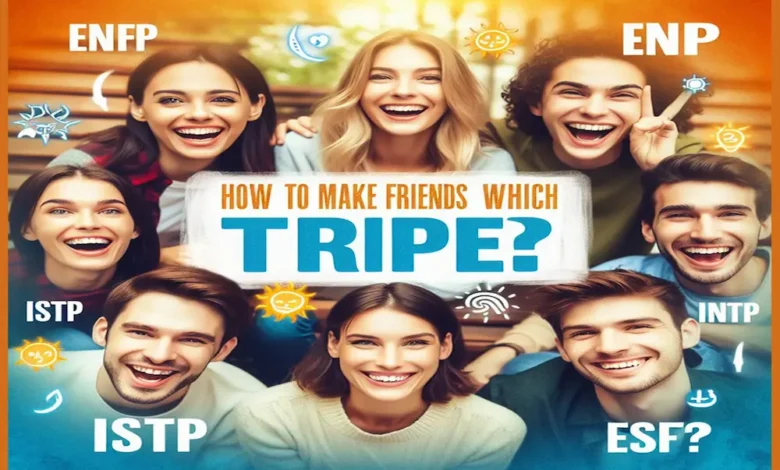Introduction
Do you ever wonder why some people are easy to get along with, while others seem to be on a different wavelength? Do you ever feel like you don’t fit in with certain groups or environments? Do you ever wish you could make more friends and have deeper connections with them?
If you answered yes to any of these questions, then this article is for you. In this article, you will learn how to Make Friends with Any MBTI Types, based on the Myers-Briggs Type Indicator, a popular personality assessment tool that divides people into 16 distinct types, based on four preferences:
Extraversion (E) or Introversion (I):
This preference indicates whether you get your energy from interacting with others or from spending time alone.
Sensing (S) or Intuition (N):
This preference indicates whether you focus more on concrete facts and details or on abstract patterns and possibilities.
Thinking (T) or Feeling (F):
This preference indicates whether you make decisions based on logic and rationality or on values and emotions.
Judging (J) or Perceiving (P):
This preference indicates whether you prefer to have a structured and organized lifestyle or a flexible and spontaneous one.
By understanding your own MBTI types and the types of others, you can gain valuable insights into your strengths, weaknesses, preferences, and motivations, as well as those of the people you interact with. You can also learn how to communicate, collaborate, and connect with them more effectively, and how to make friends with anyone you meet.
Also read: How to Use Your Core Values to Make Better Decisions » Upgrade Your Life (lifeupgrad.com)
What is MBTI and why does it matter?
MBTI stands for Myers-Briggs Type Indicator, a personality assessment tool developed by Katharine Cook Briggs and her daughter Isabel Briggs Myers, based on the psychological theory of Carl Jung. The MBTI is widely used in various settings, such as education, career, counseling, and personal development, to help people understand themselves and others better.
The MBTI is not a test that measures your skills, abilities, or intelligence. It is not a tool that labels you or puts you in a box. It is not a tool that predicts your behavior or determines your fate. It is a tool that helps you explore your preferences, tendencies, and potential, and how they relate to those of others.
The MBTI matters because it can help you improve your self-awareness, self-acceptance, and self-improvement. It can help you discover your natural gifts, talents, and passions, and how to use them to achieve your goals and dreams. It can help you identify your areas of growth, challenges, and blind spots, and how to overcome them. It can help you appreciate your uniqueness, diversity, and individuality, and how to celebrate them.
The MBTI also matters because it can help you enhance your social skills, interpersonal relationships, and emotional intelligence. It can help you understand the perspectives, needs, and expectations of others, and how to respect and accommodate them. It can help you communicate, collaborate, and cooperate with others more effectively, and how to resolve conflicts and problems more constructively. It can help you build rapport, trust, and friendship with others, and how to nurture and maintain them.
The 16 MBTI types and their main characteristics
The MBTI divides people into 16 distinct types, based on the combination of their four preferences. Each type has a four-letter code that represents their preferences, and a nickname that summarizes their main characteristics. Here is a brief overview of the 16 MBTI types and their main characteristics:
01-ISTJ (The Inspector):
ISTJs are responsible, reliable, and diligent. They value facts, logic, and order. They are loyal, hardworking, and organized. They follow rules, procedures, and traditions. They are practical, realistic, and conservative. They prefer to work alone or in small groups, and focus on details and tasks.
02-ISFJ (The Protector):
ISFJs are caring, supportive, and loyal. They value harmony, compassion, and service. They are attentive, helpful, and generous. They follow norms, expectations, and duties. They are warm, gentle, and humble. They prefer to work with people they know and trust, and focus on feelings and relationships.
03-INFJ (The Counselor):
INFJs are insightful, creative, and idealistic. They value vision, meaning, and purpose. They are intuitive, imaginative, and original. They follow their inner convictions, values, and principles. They are complex, deep, and reserved. They prefer to work independently or in small groups, and focus on ideas and possibilities.
04-INTJ (The Mastermind):
INTJs are analytical, innovative, and strategic. They value knowledge, competence, and excellence. They are logical, rational, and objective. They follow their own vision, goals, and plans. They are independent, confident, and ambitious. They prefer to work alone or with experts, and focus on systems and solutions.
05-ISTP (The Craftsman):
ISTPs are adventurous, skillful, and adaptable. They value action, experience, and freedom. They are practical, realistic, and pragmatic. They follow their own rules, interests, and impulses. They are curious, flexible, and spontaneous. They prefer to work hands-on or with tools, and focus on facts and results.
06-ISFP (The Artist):
ISFPs are expressive, artistic, and sensitive. They value beauty, harmony, and authenticity. They are creative, aesthetic, and original. They follow their own feelings, values, and desires. They are gentle, compassionate, and adventurous. They prefer to work in their own way or with people they like, and focus on sensations and emotions.
07-INFP (The Healer):
INFPs are idealistic, compassionate, and creative. They value integrity, inspiration, and individuality. They are imaginative, empathetic, and original. They follow their own dreams, values, and ideals. They are gentle, kind, and quirky. They prefer to work on their own or with like-minded people, and focus on possibilities and meanings.
08-INTP (The Architect):
INTPs are logical, curious, and inventive. They value intelligence, innovation, and accuracy. They are analytical, rational, and objective. They follow their own theories, logic, and curiosity. They are independent, ingenious, and eccentric. They prefer to work on their own or with other thinkers, and focus on concepts and problems.
09-ESTP (The Dynamo):
ESTPs are energetic, fun, and pragmatic. They value excitement, challenge, and enjoyment. They are active, adventurous, and spontaneous. They follow their own senses, instincts, and opportunities. They are confident, bold, and charismatic. They prefer to work with others or with action, and focus on facts and results.
10-ESFP (The Performer):
ESFPs are lively, entertaining, and friendly. They value fun, pleasure, and expression. They are outgoing, enthusiastic, and spontaneous. They follow their own impulses, feelings, and experiences. They are optimistic, cheerful, and charming. They prefer to work with people or with fun, and focus on sensations and emotions.
11-ENFP (The Champion):
ENFPs are enthusiastic, creative, and optimistic. They value inspiration, innovation, and exploration. They are outgoing, imaginative, and spontaneous. They follow their own passions, values, and possibilities. They are friendly, charismatic, and idealistic. They prefer to work with people or with ideas, and focus on meanings and potentials.
12-ENTP (The Inventor):
ENTPs are clever, inventive, and resourceful. They value novelty, challenge, and debate. They are outgoing, rational, and spontaneous. They follow their own logic, curiosity, and opportunities. They are confident, witty, and original. They prefer to work with people or with problems, and focus on concepts and solutions.
13-ESTJ (The Supervisor):
ESTJs are efficient, decisive, and organized. They value order, stability, and achievement. They are logical, practical, and realistic. They follow rules, standards, and goals. They are assertive, confident, and responsible. They prefer to work with others or with tasks, and focus on facts and results.
14-ESFJ (The Provider):
ESFJs are sociable, helpful, and responsible. They value harmony, cooperation, and service. They are warm, attentive, and generous. They follow norms, expectations, and duties. They are friendly, supportive, and reliable. They prefer to work with people or with relationships, and focus on feelings and values.
15-ENFJ (The Teacher):
ENFJs are charismatic, inspiring, and influential. They value growth, development, and harmony. They are warm, empathetic, and visionary. They follow their own ideals, values, and principles. They are assertive, enthusiastic, and altruistic. They prefer to work with people or with causes, and focus on meanings and potentials.
16-ENTJ (The Commander):
ENTJs are powerful, confident, and strategic. They value leadership, achievement, and competence. They are logical, rational, and objective. They follow their own vision, goals, and plans. They are decisive, ambitious, and commanding. They prefer to work with others or with challenges, and focus on systems and solutions.
How to Make Friends with Any MBTI Types?

Now that you have a general idea of the 16 MBTI types and their main characteristics, you might be wondering how to make friends with each of them. Of course, every person is unique and complex, and their personality type is not the only factor that determines their behavior, preferences, and compatibility. However, knowing their personality type can give you some clues and tips on how to approach, communicate, and connect with them more effectively, and how to make friends with anyone you meet.
Here are some suggestions on how to make friends with each MBTI types, based on their preferences and characteristics. Keep in mind that these are general guidelines, and not rules or stereotypes. You should always treat each person as an individual and respect their differences and boundaries.
How to make friends with ISTJ ?
ISTJs are responsible, reliable, and diligent. They value facts, logic, and order. They are loyal, hardworking, and organized. They follow rules, procedures, and traditions. They are practical, realistic, and conservative. They prefer to work alone or in small groups, and focus on details and tasks.
To make friends with ISTJs, you should:
- Be honest, respectful, and trustworthy. ISTJs appreciate people who are sincere, reliable, and loyal. They dislike people who are dishonest, disrespectful, or unreliable. They value integrity, honesty, and respect in their friendships.
- Be punctual, organized, and efficient. ISTJs appreciate people who are on time, prepared, and productive. They dislike people who are late, messy, or wasteful. They value order, structure, and efficiency in their activities.
- Be factual, logical, and realistic. ISTJs appreciate people who are objective, rational, and pragmatic. They dislike people who are subjective, emotional, or idealistic. They value facts, evidence, and logic in their conversations.
- Be supportive, helpful, and consistent. ISTJs appreciate people who are supportive, helpful, and consistent. They dislike people who are demanding, needy, or unpredictable. They value stability, security, and consistency in their relationships.
How to make friends with ISFJ ?
ISFJs are caring, supportive, and loyal. They value harmony, compassion, and service. They are attentive, helpful, and generous. They follow norms, expectations, and duties. They are warm, gentle, and humble. They prefer to work with people they know and trust, and focus on feelings and relationships.
To make friends with ISFJs, you should:
- Be kind, polite, and considerate. ISFJs appreciate people who are kind, polite, and considerate. They dislike people who are rude, insensitive, or selfish. They value kindness, courtesy, and consideration in their friendships.
- Be attentive, appreciative, and supportive. ISFJs appreciate people who are attentive, appreciative, and supportive. They dislike people who are indifferent, ungrateful, or critical. They value attention, appreciation, and support in their activities.
- Be personal, emotional, and sentimental. ISFJs appreciate people who are personal, emotional, and sentimental. They dislike people who are impersonal, detached, or cold. They value feelings, memories, and traditions in their conversations.
- Be loyal, dependable, and trustworthy. ISFJs appreciate people who are loyal, dependable, and trustworthy. They dislike people who are disloyal, unreliable, or dishonest. They value loyalty, dependability, and trustworthiness in their relationships.
How to make friends with INFJ ?
INFJs are insightful, creative, and idealistic. They value vision, meaning, and purpose. They are intuitive, imaginative, and original. They follow their inner convictions, values, and principles. They are complex, deep, and reserved. They prefer to work independently or in small groups, and focus on ideas and possibilities.
To make friends with INFJs, you should:
- Be authentic, respectful, and open-minded. INFJs appreciate people who are authentic, respectful, and open-minded. They dislike people who are fake, disrespectful, or closed-minded. They value authenticity, respect, and open-mindedness in their friendships.
- Be curious, creative, and inspiring. INFJs appreciate people who are curious, creative, and inspiring. They dislike people who are boring, conventional, or dull. They value curiosity, creativity, and inspiration in their activities.
- Be deep, meaningful, and insightful. INFJs appreciate people who are deep, meaningful, and insightful. They dislike people who are shallow, superficial, or trivial. They value depth, meaning, and insight in their conversations.
- Be loyal, supportive, and understanding. INFJs appreciate people who are loyal, supportive, and understanding. They dislike people who are disloyal, unsupportive, or misunderstanding. They value loyalty, support, and understanding in their relationships.
How to make friends with INTJ ?
INTJs are analytical, innovative, and strategic. They value knowledge, competence, and excellence. They are logical, rational, and objective. They follow their own vision, goals, and plans. They are independent, confident, and ambitious. They prefer to work alone or with experts, and focus on systems and solutions.
To make friends with INTJs, you should:
- Be intelligent, competent, and knowledgeable. INTJs appreciate people who are intelligent, competent, and knowledgeable. They dislike people who are ignorant, incompetent, or uninformed. They value intelligence, competence, and knowledge in their friendships.
- Be challenging, stimulating, and productive. INTJs appreciate people who are challenging, stimulating, and productive. They dislike people who are easy, boring, or unproductive. They value challenge, stimulation, and productivity in their activities.
- Be logical, objective, and rational. INTJs appreciate people who are logical, objective, and rational. They dislike people who are illogical, subjective, or emotional. They value logic, objectivity, and rationality in their conversations.
- Be independent, ambitious, and visionary. INTJs appreciate people who are independent, ambitious, and visionary. They dislike people who are dependent, complacent, or short-sighted. They value independence, ambition, and vision in their relationships.
How to make friends with ISTP ?
ISTPs are adventurous, skillful, and adaptable. They value action, experience, and freedom. They are practical, realistic, and pragmatic. They follow their own rules, interests, and impulses. They are curious, flexible, and spontaneous. They prefer to work hands-on or with tools, and focus on facts and results.
To make friends with ISTPs, you should:
- Be fun, adventurous, and spontaneous. ISTPs appreciate people who are fun, adventurous, and spontaneous. They dislike people who are boring, cautious, or predictable. They value fun, adventure, and spontaneity in their friendships.
- Be active, skillful, and practical. ISTPs appreciate people who are active, skillful, and practical. They dislike people who are passive, clumsy, or impractical. They value activity, skill, and practicality in their activities.
- Be factual, direct, and concise. ISTPs appreciate people who are factual, direct, and concise. They dislike people who are vague, indirect, or verbose. They value facts, directness, and conciseness in their conversations.
- Be independent, flexible, and easygoing. ISTPs appreciate people who are independent, flexible, and easygoing. They dislike people who are dependent, rigid, or demanding. They value independence, flexibility, and easygoingness in their relationships.
How to make friends with ISFP ?
ISFPs are expressive, artistic, and sensitive. They value beauty, harmony, and authenticity. They are creative, aesthetic, and original. They follow their own feelings, values, and desires. They are gentle, compassionate, and adventurous. They prefer to work in their own way or with people they like, and focus on sensations and emotions.
To make friends with ISFPs, you should:
- Be genuine, appreciative, and accepting. ISFPs appreciate people who are genuine, appreciative, and accepting. They dislike people who are fake, ungrateful, or judgmental. They value genuineness, appreciation, and acceptance in their friendships.
- Be creative, artistic, and expressive. ISFPs appreciate people who are creative, artistic, and expressive. They dislike people who are dull, boring, or unoriginal. They value creativity, artistry, and expression in their activities.
- Be personal, emotional, and empathetic. ISFPs appreciate people who are personal, emotional, and empathetic. They dislike people who are impersonal, detached, or cold. They value personality, emotion, and empathy in their conversations.
- Be loyal, supportive, and adventurous. ISFPs appreciate people who are loyal, supportive, and adventurous. They dislike people who are disloyal, unsupportive, or boring. They value loyalty, support, and
adventure in their relationships.
How to make friends with INFP ?
INFPs are idealistic, compassionate, and creative. They value integrity, inspiration, and individuality. They are imaginative, empathetic, and original. They follow their own dreams, values, and ideals. They are gentle, kind, and quirky. They prefer to work on their own or with like-minded people, and focus on possibilities and meanings.
To make friends with INFPs, you should:
- Be authentic, respectful, and supportive. INFPs appreciate people who are authentic, respectful, and supportive. They dislike people who are fake, disrespectful, or unsupportive. They value authenticity, respect, and support in their friendships.
- Be inspiring, creative, and adventurous. INFPs appreciate people who are inspiring, creative, and adventurous. They dislike people who are dull, boring, or conventional. They value inspiration, creativity, and adventure in their activities.
- Be meaningful, emotional, and expressive. INFPs appreciate people who are meaningful, emotional, and expressive. They dislike people who are superficial, detached, or unexpressive. They value meaning, emotion, and expression in their conversations.
- Be loyal, understanding, and accepting. INFPs appreciate people who are loyal, understanding, and accepting. They dislike people who are disloyal, misunderstanding, or judgmental. They value loyalty, understanding, and acceptance in their relationships.
How to make friends with INTP ?
INTPs are logical, curious, and inventive. They value intelligence, innovation, and accuracy. They are analytical, rational, and objective. They follow their own theories, logic, and curiosity. They are independent, ingenious, and eccentric. They prefer to work on their own or with other thinkers, and focus on concepts and problems.
To make friends with INTPs, you should:
- Be intelligent, knowledgeable, and competent. INTPs appreciate people who are intelligent, knowledgeable, and competent. They dislike people who are ignorant, uninformed, or incompetent. They value intelligence, knowledge, and competence in their friendships.
- Be challenging, stimulating, and interesting. INTPs appreciate people who are challenging, stimulating, and interesting. They dislike people who are easy, boring, or uninteresting. They value challenge, stimulation, and interest in their activities.
- Be logical, objective, and rational. INTPs appreciate people who are logical, objective, and rational. They dislike people who are illogical, subjective, or emotional. They value logic, objectivity, and rationality in their conversations.
- Be independent, original, and open-minded. INTPs appreciate people who are independent, original, and open-minded. They dislike people who are dependent, conventional, or closed-minded. They value independence, originality, and open-mindedness in their relationships.
How to make friends with ESTP ?
ESTPs are energetic, fun, and pragmatic. They value excitement, challenge, and enjoyment. They are active, adventurous, and spontaneous. They follow their own senses, instincts, and opportunities. They are confident, bold, and charismatic. They prefer to work with others or with action, and focus on facts and results.
To make friends with ESTPs, you should:
- Be fun, adventurous, and spontaneous. ESTPs appreciate people who are fun, adventurous, and spontaneous. They dislike people who are boring, cautious, or predictable. They value fun, adventure, and spontaneity in their friendships.
- Be active, skillful, and practical. ESTPs appreciate people who are active, skillful, and practical. They dislike people who are passive, clumsy, or impractical. They value activity, skill, and practicality in their activities.
- Be direct, honest, and concise. ESTPs appreciate people who are direct, honest, and concise. They dislike people who are indirect, dishonest, or verbose. They value directness, honesty, and conciseness in their conversations.
- Be confident, bold, and charismatic. ESTPs appreciate people who are confident, bold, and charismatic. They dislike people who are insecure, timid, or dull. They value confidence, boldness, and charisma in their relationships.
How to make friends with ESFP ?
ESFPs are lively, entertaining, and friendly. They value fun, pleasure, and expression. They are outgoing, enthusiastic, and spontaneous. They follow their own impulses, feelings, and experiences. They are optimistic, cheerful, and charming. They prefer to work with people or with fun, and focus on sensations and emotions.
To make friends with ESFPs, you should:
- Be fun, lively, and cheerful. ESFPs appreciate people who are fun, lively, and cheerful. They dislike people who are boring, dull, or gloomy. They value fun, liveliness, and cheerfulness in their friendships.
- Be expressive, creative, and adventurous. ESFPs appreciate people who are expressive, creative, and adventurous. They dislike people who are unexpressive, uncreative, or cautious. They value expression, creativity, and adventure in their activities.
- Be personal, emotional, and empathetic. ESFPs appreciate people who are personal, emotional, and empathetic. They dislike people who are impersonal, detached, or cold. They value personality, emotion, and empathy in their conversations.
- Be optimistic, enthusiastic, and supportive. ESFPs appreciate people who are optimistic, enthusiastic, and supportive. They dislike people who are pessimistic, apathetic, or unsupportive. They value optimism, enthusiasm, and support in their relationships.
How to make friends with ENFP ?
ENFPs are enthusiastic, creative, and optimistic. They value inspiration, innovation, and exploration. They are outgoing, imaginative, and spontaneous. They follow their own passions, values, and possibilities. They are friendly, charismatic, and idealistic. They prefer to work with people or with ideas, and focus on meanings and potentials.
To make friends with ENFPs, you should:
- Be authentic, respectful, and open-minded. ENFPs appreciate people who are authentic, respectful, and open-minded. They dislike people who are fake, disrespectful, or closed-minded. They value authenticity, respect, and open-mindedness in their friendships.
- Be inspiring, creative, and adventurous. ENFPs appreciate people who are inspiring, creative, and adventurous. They dislike people who are dull, boring, or conventional. They value inspiration, creativity, and adventure in their activities.
- Be meaningful, emotional, and expressive. ENFPs appreciate people who are meaningful, emotional, and expressive. They dislike people who are superficial, detached, or unexpressive. They value meaning, emotion, and expression in their conversations.
- Be loyal, supportive, and understanding. ENFPs appreciate people who are loyal, supportive, and understanding. They dislike people who are disloyal, unsupportive, or misunderstanding. They value loyalty, support, and understanding in their relationships.
How to make friends with ENTP ?
ENTPs are clever, inventive, and resourceful. They value novelty, challenge, and debate. They are outgoing, rational, and spontaneous. They follow their own logic, curiosity, and opportunities. They are confident, witty, and original. They prefer to work with people or with problems, and focus on concepts and solutions.
To make friends with ENTPs, you should:
- Be intelligent, knowledgeable, and competent. ENTPs appreciate people who are intelligent, knowledgeable, and competent. They dislike people who are ignorant, uninformed, or incompetent. They value intelligence, knowledge, and competence in their friendships.
- Be challenging, stimulating, and interesting. ENTPs appreciate people who are challenging, stimulating, and interesting. They dislike people who are easy, boring, or uninteresting. They value challenge, stimulation, and interest in their activities.
- Be logical, objective, and rational. ENTPs appreciate people who are logical, objective, and rational. They dislike people who are illogical, subjective, or emotional. They value logic, objectivity, and rationality in their conversations.
- Be independent, original, and open-minded. ENTPs appreciate people who are independent, original, and open-minded. They dislike people who are dependent, conventional, or closed-minded. They value independence, originality, and open-mindedness in their relationships.
How to make friends with ESTJ ?
ESTJs are efficient, decisive, and organized. They value order, stability, and achievement. They are logical, practical, and realistic. They follow rules, standards, and goals. They are assertive, confident, and responsible. They prefer to work with others or with tasks, and focus on facts and results.
To make friends with ESTJs, you should:
- Be honest, respectful, and reliable. ESTJs appreciate people who are honest, respectful, and reliable. They dislike people who are dishonest, disrespectful, or unreliable. They value honesty, respect, and reliability in their friendships.
- Be punctual, organized, and productive. ESTJs appreciate people who are punctual, organized, and productive. They dislike people who are late, messy, or unproductive. They value punctuality, organization, and productivity in their activities.
- Be factual, logical, and realistic. ESTJs appreciate people who are factual, logical, and realistic. They dislike people who are vague, emotional, or idealistic. They value facts, logic, and realism in their conversations.
- Be assertive, confident, and ambitious. ESTJs appreciate people who are assertive, confident, and ambitious. They dislike people who are passive, insecure, or complacent. They value assertiveness, confidence, and ambition in their relationships.
How to make friends with ESFJ ?
ESFJs are sociable, helpful, and responsible. They value harmony, cooperation, and service. They are warm, attentive, and generous follow norms, expectations, and duties. They are friendly, supportive, and reliable. They prefer to work with people or with relationships, and focus on feelings and values.
To make friends with ESFJs, you should:
- Be kind, polite, and considerate. ESFJs appreciate people who are kind, polite, and considerate. They dislike people who are rude, insensitive, or selfish. They value kindness, courtesy, and consideration in their friendships.
- Be attentive, appreciative, and supportive. ESFJs appreciate people who are attentive, appreciative, and supportive. They dislike people who are indifferent, ungrateful, or critical. They value attention, appreciation, and support in their activities.
- Be personal, emotional, and sentimental. ESFJs appreciate people who are personal, emotional, and sentimental. They dislike people who are impersonal, detached, or cold. They value feelings, memories, and traditions in their conversations.
- Be loyal, dependable, and trustworthy. ESFJs appreciate people who are loyal, dependable, and trustworthy. They dislike people who are disloyal, unreliable, or dishonest. They value loyalty, dependability, and trustworthiness in their relationships.
How to make friends with ENFJ ?
ENFJs are charismatic, inspiring, and influential. They value growth, development, and harmony. They are warm, empathetic, and visionary. They follow their own ideals, values, and principles. They are assertive, enthusiastic, and altruistic. They prefer to work with people or with causes, and focus on meanings and potentials.
To make friends with ENFJs, you should:
- Be authentic, respectful, and open-minded. ENFJs appreciate people who are authentic, respectful, and open-minded. They dislike people who are fake, disrespectful, or closed-minded. They value authenticity, respect, and open-mindedness in their friendships.
- Be inspiring, creative, and adventurous. ENFJs appreciate people who are inspiring, creative, and adventurous. They dislike people who are dull, boring, or conventional. They value inspiration, creativity, and adventure in their activities.
- Be meaningful, emotional, and expressive. ENFJs appreciate people who are meaningful, emotional, and expressive. They dislike people who are superficial, detached, or unexpressive. They value meaning, emotion, and expression in their conversations.
- Be loyal, supportive, and understanding. ENFJs appreciate people who are loyal, supportive, and understanding. They dislike people who are disloyal, unsupportive, or misunderstanding. They value loyalty, support, and understanding in their relationships.
How to make friends with ENTJ ?
ENTJs are powerful, confident, and strategic. They value leadership, achievement, and competence. They are logical, rational, and objective. They follow their own vision, goals, and plans. They are decisive, ambitious, and commanding. They prefer to work with others or with challenges, and focus on systems and solutions.
To make friends with ENTJs, you should:
- Be intelligent, competent, and knowledgeable. ENTJs appreciate people who are intelligent, competent, and knowledgeable. They dislike people who are ignorant, incompetent, or uninformed. They value intelligence, competence, and knowledge in their friendships.
- Be challenging, stimulating, and productive. ENTJs appreciate people who are challenging, stimulating, and productive. They dislike people who are easy, boring, or unproductive. They value challenge, stimulation, and productivity in their activities.
- Be logical, objective, and rational. ENTJs appreciate people who are logical, objective, and rational. They dislike people who are illogical, subjective, or emotional. They value logic, objectivity, and rationality in their conversations.
- Be assertive, confident, and ambitious. ENTJs appreciate people who are assertive, confident, and ambitious. They dislike people who are passive, insecure, or complacent. They value assertiveness, confidence, and ambition in their relationships.
Conclusion
In this article, you have learned how to make friends with any MBTI types, based on the Myers-Briggs Type Indicator, a popular personality assessment tool that divides people into 16 distinct types, based on four preferences. You have also learned the main characteristics and preferences of each type, and some suggestions on how to approach, communicate, and connect with them more effectively.
Of course, these are not the only factors that determine your compatibility and friendship with others. There are many other aspects of your personality, such as your interests, hobbies, values, goals, and experiences, that also influence your relationships. Moreover, every person is unique and complex, and their personality type is not a fixed or definitive label. People can change, grow, and develop over time, and their preferences can vary depending on the situation and context.
Therefore, you should always treat each person as an individual, and respect their differences and boundaries. You should also be yourself, and not try to change or pretend to be someone you are not. You should be open-minded, curious, and respectful of other perspectives, and not judge or stereotype others based on their personality type. You should also be honest, loyal, and supportive of your friends, and not take them for granted or betray them.
By doing so, you can make friends with anyone you meet, regardless of their personality type, and enjoy the benefits of having a diverse, enriching, and fulfilling social life. 🙌
**** Resources to download and listen to free books about: Personality Types – search | Open Library
Frequently asked questions and their answers
What is MBTI?
MBTI stands for Myers-Briggs Type Indicator, a personality assessment tool developed by Katharine Cook Briggs and her daughter Isabel Briggs Myers, based on the psychological theory of Carl Jung. The MBTI divides people into 16 distinct types, based on four preferences: Extraversion (E) or Introversion (I), Sensing (S) or Intuition (N), Thinking (T) or Feeling (F), and Judging (J) or Perceiving (P).
How can I find out my MBTI types?
You can find out your MBTI types by taking an official or unofficial online test, or by consulting a certified MBTI practitioner. However, you should keep in mind that these tests are not 100% accurate or reliable, and that your type may change over time or depending on the situation. Therefore, you should use them as a guide, not as a diagnosis, and always verify your results with your own self-reflection and feedback from others.
How can I use MBTI to improve my relationships?
You can use MBTI to improve your relationships by understanding your own and others’ personality types, preferences, and characteristics, and how they affect your communication, collaboration, and connection. You can also use MBTI to appreciate the diversity, uniqueness, and individuality of yourself and others, and to respect and accommodate the differences and boundaries of each person. You can also use MBTI to communicate, collaborate, and connect with others more effectively, and to build rapport, trust, and friendship with anyone you meet.







Your article helped me a lot, is there any more related content? Thanks!
Can you be more specific about the content of your article? After reading it, I still have some doubts. Hope you can help me.